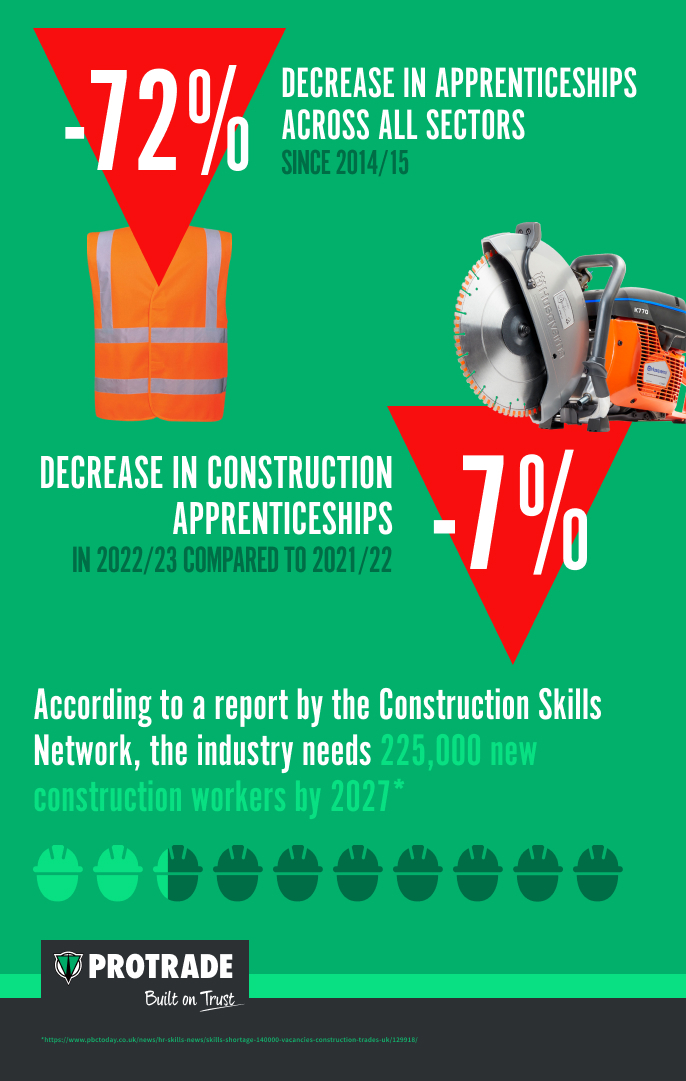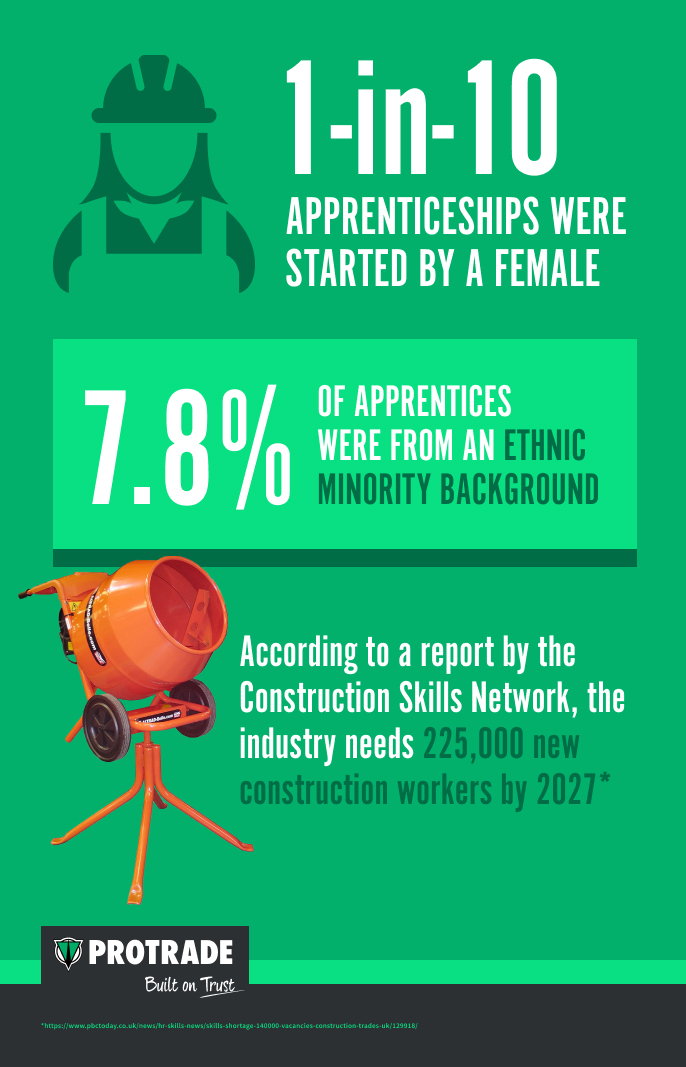State of Construction Apprenticeship Report 2024

Reading Time: 7 Mins⏱️
Fresh data analysis, from the Construction Apprenticeship Report 2024, conducted by Protrade ahead of National Apprenticeship Week 2024 has revealed that there has been a 5% decrease in the uptake of construction apprenticeships across the UK in the last 12 months.
A review of the latest Government data shows there were approximately 24,530 new apprentices taken on in construction between 2022-23, down from the 26,060 recorded the previous year (2021-22).
Whilst those figures remain higher than the ones posted in 2019-20 and 2020-21, the latest decline highlights the sector’s continuing struggle to entice people into the industry, amid the skills shortage crisis.
To help counteract that, The UK government set a target of 3 million apprenticeship starts in England between 2015 and 2020, focusing on sectors such as engineering, construction, and ICT. However, given the sector’s continuing struggle to meet its target, the Construction Industry Training Body (CITB) suggests that approximately 45,000 people would need to join the sector every year for the next five years to meet the growing demand.
Forecasts indicate that the UK have the fastest-growing construction market of the major Western European economies over the next 15 years. The sector was estimated to have hit £381 billion in revenue in 2023 alone.
Analysing the latest data set, Craig Sanders, Joint Managing Director at Protrade, said: “While there is an acknowledgement that more needs to be done to raise awareness of a career in construction, there remain barriers that need overcoming. There is still a notable lack of sector-specific focus within settings like education. It’s crucial to enhance awareness of construction college opportunities and foster a more accessible approach.
“The construction industry needs to ask itself the question as to whether it is setting the bar too high for entry-level positions, particularly when it comes to high academic requirements. We’re in danger of unintentionally excluding valuable talent by setting impossibly high standards as we compete with other job opportunities in different sectors that have become more favourable.
“Contrary to outdated perceptions, today’s construction industry is cleaner and safer. We need to dispel the lingering notion of it being a ‘dirty’ environment and encourage a fresh perspective among potential apprentices.”
The state of construction apprenticeships: a deeper analysis
When analysing the last five years of apprenticeship uptake within construction, data shows that very little progress has been made since 2018.
As previously alluded to in this report, approximately 22,700 people took up apprenticeship positions in construction between 2022-23, representing a decline year-on-year when compared to 2021-22 figures which were at their highest over the last five years.
The average construction apprenticeship role uptake in the UK over the last five years (2018-2023):
- 2018-19 = 22,530
- 2019-20 = 21,920 (-2% drop)
- 2020-21 = 19,960 (-8% drop)
- 2021-22 = 26,060 (+30% increase)
- 2022-23 = 24,530 (-5% drop)
Analysing the above, the data shows the sector has almost come full circle.

After the expected decline in apprenticeship roles taken up during COVID-19, there was an equally significant recovery. But despite the initial spike, the sector continues to trail below the level required to meet the demand borne by the growing skills gap crisis, which is highlighted by another report in 2023 suggesting that there were as many as 140,000 construction and trades vacancies in the UK. Furthermore, a survey by recruitment specialist Search Consultancy found that 83% of businesses within the construction industry are currently feeling the strain from a lack of skilled workers.
When analysing the top 100 most popular apprenticeship roles taken up between 2022-23, it was clear that construction-relevant roles lag behind areas such as data analysis, early years education, accounting, and digital technology.
Plumbing and Domestic Heating Technician (29th) was the most popular construction-relevant position taken up, according to recent data, narrowly ahead of Bricklayer (34th). Supply Chain Warehouse Operatives and Engineering Operatives also feature in the top 100 list.
Female and ethnic minorities’ apprenticeship uptake reached the highest point
Construction has a history of struggling to attract female and ethnic minorities into the industry and continues to have a stigma for being a middle-aged white male-dominated industry.
male-dominated industry.
However, as attitudes change, technology becomes more prevalent, and jobs diversify, construction continues to slowly widen its demographic scope, with the latest data showing that female and ethnic minority uptake of construction apprenticeships reached their highest-ever point respectively.
Encouragingly, nearly 10% of the estimated 24,530 uptake figure across the UK was made up of female new starters, growing by more than 2% on the previous year’s estimate (21-22).
That growth aside, significant work still needs to be done to make construction more diverse. Morgan Siddall’s report Are we Gen Z ready? revealed that 57% of women and girls are still put off from considering a career in the construction sector because they believe it is male-dominated. Further statistics back that notion, with only 12.37% of all engineers in the UK being female, according to data published by Engineering UK.
The sector continues to lag significantly behind other industries when analysing gender split. There remains an imbalance and when compared against other industries for gender balance across roles, construction still sits last. Only 14.7% of those employed in the industry are women, nearly 33% lower than the UK average.
Meanwhile, nearly 8% of this figure was made up of ethnic minority backgrounds – a 1% increase from the previous year’s findings (21-22). While this marks an improvement, the picture is very similar to that of female uptake within construction, with the Construction Industry Council highlighting that just 5.4% of all construction workers in the UK are from a Black, Asian or ethnic minority background.
Improving apprenticeship uptake in the future – where does the solution lie?
Today the availability of labour is now the number one issue within the UK construction sector, with wages continuing to rise due to the shortage of skilled workers.
The biggest barrier the construction industry faces in addressing that skills gap is its ability to engage with young people across the UK and convince them that a career in the sector is worth pursuing.
As well as the stigma issues alluded to earlier, the attitudes of Gen-Z towards the climate crisis are another hurdle. Data shows that a large majority (62%) of young people are not only aware of the climate emergency but also engaged with it. While this is a beacon of hope for the future of the planet, it’s a blow for the construction industry as only 1 in 3 of those surveyed see the sector as one that they can work in to address our climate crisis.
There are other issues to consider here as well. The decline in apprenticeship uptake has been attributed to factors such as a reduction in funding and grants, the impact of the apprenticeship levy, and the recession, which have made it challenging to attract individuals to construction apprenticeships.
Despite its lofty targets, it is worth noting that the UK government has significantly reduced funding and grants for apprenticeships over the last decade. In England, government spending on adult education and apprenticeships is projected to be 25% lower in 2025 than in 2010, despite an additional £900 million promised in the 2021 spending review.
So, where does the answer lie? In Craig Sanders’ opinion, the answer is to heighten the visibility of the sector within the education setting and also lower the barrier to entry. He cites the approach the RAF and Army have taken to reach out to people more directly and enticingly, highlighting the many career opportunities available.
He said: “The sector’s focus should be on how to attract the younger demographic. It’s been discussed extensively, but the question remains: how can we make the construction sector more appealing?
“There are several avenues to explore, from incentivising uptake with increased salaries to launching impactful marketing campaigns. More needs to be done to engage at the grassroots level, especially with career advisors to help them actively promote a career in the industry.
“Considering the substantial contribution of construction to the UK’s GDP and the existing skill shortage, it’s not just a preference to push a career in construction but an economic necessity to draw more individuals into this sector.
“The demand for skilled workers is high and we need a robust supply of people turning to a career in construction, achieving that requires a concerted effort. Construction companies consistently voice these concerns, but if the younger generation isn’t exposed to the opportunities within construction, the gap we currently see will remain.”
Image credit: Unsplash. Infographics provided have been supplied by Protrade

Joint Managing Director, Protrade
Des has over 30 years of experience at Protrade, having worked in the capacity of Sales Co-ordinator, Account Manager, and product development, culminating in being appointed Joint Managing Director in 2018.



